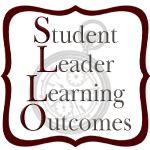As the director of Student Life Studies, I have a
unique perspective on student learning. I see the departments, advisors, and
students coming to our office for student learning assessment help. They want
to improve their programs to meet the needs of today’s students. I also see
what’s happening on the institution level: Accreditors want to know what
students are learning in their college career.
For many years, staff in student affairs were not
really plugged into student learning assessment. They were focused on student
services and student development, both of which are necessities on college
campuses. In recent years, though, there has been a shift in higher education
that demands we also focus on what students are learning. It’s not always just
about putting on a great program or providing a needed service; it’s about what
students are learning from those activities. In addition, it can be about what
the student leaders are learning from being in charge of those programs and
events. We know students are learning; we need to be able to show the learning.
Universities are being asked to provide evidence
and documentation that students are, in fact, learning something, not just in
their classes, but also in the rest of their experiences. Obviously, students
should learn their discipline, but they should also be able to communicate
effectively, work well with others, and make good decisions. Faculty may have
an easier time assessing learning, particularly as it relates to discipline
knowledge. They are seeing students for an extended period of time, require
some sort of artifact (test, papers, projects), and provide feedback along the
way for students to improve performance. Depending on the situation, faculty
may incorporate communication opportunities (written paper, oral presentation),
group projects, and ethical dilemma case studies in the courses. I like to
think that students then have the ability to transfer that information to
different settings and improve over time. Student affairs staff can also
develop these skills in students, beyond the confines of the classroom walls.
So, what is the Big Idea? The big idea is that
learning takes place in all kinds of settings, all the time, and in all kinds
of ways, and we need to make it our focus and reason for being. The future of
our country (and the world) depends on it. In We’re Losing Our Minds: Rethinking American Higher Education,
Keeling and Hersh argue that America is being held back by the quality and
quantity of learning in college. Graduates can’t communicate, solve problems, comprehend
complex issues, accept responsibility, understand others’ perspectives, or meet
employer expectations (p. 1). There is a crisis in student learning (“there is
not enough higher learning in high education” [p. viii]) that we need to
acknowledge and address in new ways. In brief, some of their principles
include:
- Higher learning requires the collective effort of the entire faculty and staff. We need to agree on ends (outcomes) and means (rigorous thinking, writing, reading, ethical behavior, etc.).
- Higher learning occurs horizontally, across experiences in and out of the classroom, as well as vertically within major and disciplines, and in ways that are necessarily cumulative. Higher learning is synergistic and requires integrated design.
- Assessment is an intentional process of helping students learn, including how to seek, use, and internalize assessment processes and results.
- All learning—intellectual, developmental, social, and emotional—happens through changes in the brain. There is guidance about developing pedagogies to help students learn more effectively.
- The individual learner matters in the learning. Students’ readiness is a complex construct that influences persistence, achievement, learning, and success.
- Students’ individual levels of engagement and investment in their college education are also fundamental factors that affect achievement, persistence, and success. (pp. 21-22)
All of us should be concerned with the value (rather than
just cost) of higher education and how to improve the learning among college
students of today. Student affairs professionals have a significant role in preparing
students to be the thinkers, learners, and leaders of tomorrow. It is a big
idea that requires new thinking and engagement, right here, right now.
- Darby Roberts










No comments:
Post a Comment